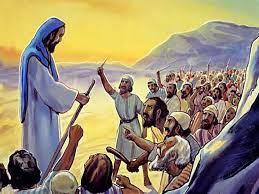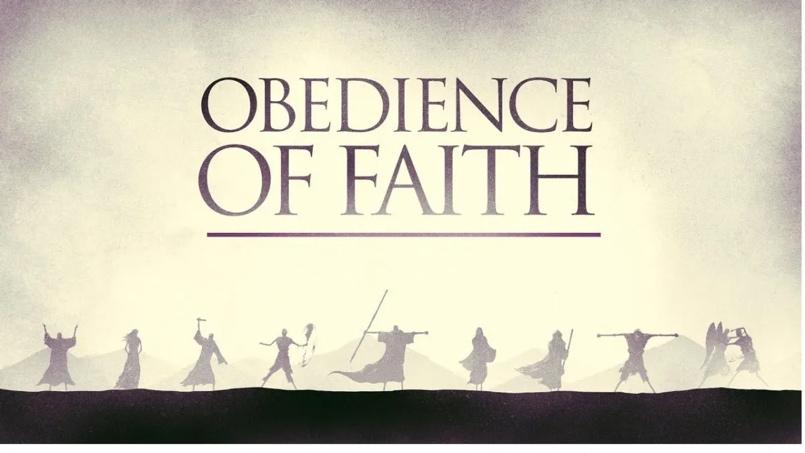Faith and Obedience
Numbers 14:1-4 and Hebrews 3:7-4:13
Faith and Obedience DIG: Within reach of the Promised Land, the Israelites now pull back from their goal. Why do you think they did this? In their desire to return to Egypt, what were the people really expressing? What is a midrash (see glossary)? How was entering into the Promised Land similar to entering faith in Yeshua Messiah?
REFLECT: Have you ever found yourself grumbling and complaining about your spiritual leaders or the situations that God has placed in your life? Why is it a serious matter to grumble and complain about God’s purposes? Who do you know that has not stepped over the line from knowledge to faith in Yeshua Messiah? How can you pray for them this week?
The people’s rebellion and failure to enter the Promised Land
is the subject of a midrash in Hebrews 3:7 to 4:13.

Utterly disheartened by the spies’ evil report (to see link click By – The Report of the Spies), the children of Isra’el fell into despair. They cried out in dismay and wept all night long. The lies of the ten spies had their intended effect. Moreover, all the people of Isra’el became afraid and began grumbling against Moshe and Aaron. The whole community told them, “If only we had died in the land of Egypt! or died in this wilderness (soon they will get their wish)! Why is ADONAI bringing us to this land, where we will die by the sword?” They made no mention of the supposed greater danger that awaited them in a land which, they alleged, devours its inhabitants. They used their women and children as pretense for their lack of faith. Our wives and our little ones will be taken as booty! Wouldn’t it be better for us to return to Egypt?” Then, the Israelites spoke words that completely destroyed their covenant relationship with YHVH as they said to each other, “Let’s appoint a leader (which Nehemiah 9:17 tells us they actually did) and return to Egypt” (14:1-4). They lacked both faith and obedience.
In a series of a few brief lines, the Israelites rejected all that Ha’Shem had done for them. They rejected all the promises that the LORD had made since first calling Abraham and Sarah to leave their homeland and to go to the land of Canaan. There, God had promised Abraham and Sarah, “To your offspring I will give this Land” (Genesis 12:7). Therefore, their faithlessness was inexcusable. They had experienced the revelation of Heaven unlike any generation before or after them. They saw the ten plagues and the dividing of the Sea of Reeds. They saw the Sh’khinah glory. They had heard the Voice at Mount Sinai and seen the fire. They had seen the Tabernacle filled with glory, and they had seen the fire leap out and consume the sacrifices upon the bronze altar. They had Moshe to speak directly on God’s behalf. They witnessed provision of manna, water, and quail. They should have been as fearless as lions. But all of these gracious acts and gifts of God were forgotten and discarded. Their failure is inexplicable. They tested and tried My patience, even though they had seen My work (Psalm 95:9).
Lack of faith (Psalm 95): Hebrews 3:7-4:13 (see the commentary on Hebrews Ar – The Superiority of Messiah in the Rest He Gives) is primarily a midrash on Psalm 95, which is regarded as a Sabbath psalm. In the synagogue service today, it’s the psalm used to welcome in the Sabbath on Friday evenings. Furthermore, it is regarded as a psalm about the Messianic Kingdom (see the commentary on Revelation Fh – The Dispensation of the Messianic Kingdom). Every Shabbat is a foretaste of that great Sabbath of rest and peace. Come, let’s sing to ADONAI! Let’s shout for joy to the Rock of our salvation! Let’s come into His presence with thanksgiving; let’s shout for joy to Him with songs of praise (Psalm 95:1-2).245
But the psalm also contains a warning against the mistakes of their forefathers, and is introduced with urgency: If only today you would listen to His voice, “Don’t harden your hearts, as you did at Meribah (meaning quarreling, see the commentary on Exodus Cu – Strike the Rock and Water Will Come Out of It), as you did on that day at Massah (meaning testing) in the desert, when your fathers put Me to the test; they challenged Me, even though they saw My work. For forty years I loathed that generation; I said: This is a people whose hearts go astray, they don’t understand how I do things” (Psalm 95:7b-10). For forty years YHVH struggled with the Exodus generation. Like Pharaoh before them, how many times did they need to see God work before they understood? Did they not see that God had their best interests at heart? How tenderly and patiently He had shepherded His flock, but they had disappointed and angered Him. In their hearts they had wandered from Him, and had never learned from His gracious ways. The psalm ends abruptly: Therefore, I swore in My anger that they would not enter My rest (Psalm 95:11).246

Sabbath rest for God’s people: Psalm 95 is quoted extensively in Hebrews 3. The writer of Hebrews is obviously aware of both Sabbath and Messianic Kingdom interpretations of Psalm 95 as he employs them both. Furthermore, he derives his own lesson from the words: Today, if you would hear His voice, do not harden your hearts . . . (Hebrews 3:7-8 quoting Psalm 95:7-8). Take care, brethren, that there not be in any one of you an evil, unbelieving heart that falls away from the living God. But encourage one another day after day, as long as it is still called “Today,” so that none of you will be hardened by the deceitfulness of sin” (Hebrews 3:12-13). He warns the believers reading his letter that just as Ha’Shem did not spare the Exodus generation of the wilderness, neither would He spare the current generation. He compares entering into the Promised Land to entering faith in Yeshua Messiah. Both require faith and obedience. The writer of Hebrews says: Those who disobeyed . . . were not able to enter because of unbelief (Hebrews 3:19).
But what is the “rest” which they were not able to enter? The writer to the Hebrews points out that God’s rest began on the Sabbath following creation, but it has never ceased. He did not go back to work on Monday. Therefore, the Sabbath rest of YHVH is more than the seventh-day Sabbath, it is an eternal Sabbath rest. It is the rest of the World to Come (see the commentary on Revelation Fq – The Eternal State). Seeing that the Exodus generation did not enter this eternal rest, the writer of Hebrews deduces that some will, namely those who do not disobey. That is why the Psalm warns us not to be like them, but rather to listen to God’s voice “Today.” On the day we hear His voice (obeying Him), we will enter “Today” (the Sabbath rest of God). This is essentially the same interpretation the Oral Law (see The Life of Christ Ei – The Oral Law) gave for Psalm 95; the Sabbath rest is a picture of the World to Come, and the disobedient will not enter it.
In the book of Hebrews, the Exodus generation is used as a midrash example. The writer of Hebrews says: For we also have had the Good News proclaimed to us, just as they did; but the message they heard was of no value to them, because they did not share the faith of those who obeyed (Hebrews 4:2). From the perspective of the writer of Hebrews (a First Century Jewish believer writing to other First Century Jewish believers) the situation is similar to that of the Exodus generation about to enter the Land. The entrance into the Promised Land and the message of the Messiah are similar because, just like the Promised Land, Messiah is the culmination of the whole Torah. Everything had been leading up to that point. Just like being poised on the edge of the Promised Land, those believers in the diaspora that he was writing to were poised on the edge of the World to Come in Messiah. It is the World to Come that we speak (Hebrews 2:5).
He writes to the disenfranchised believing community which was tempted to turn away from Messiah, just as the Exodus generation in the wilderness was tempted to turn away from the Promised Land. All those Jewish believers needed to do to be accepted back into mainstream Judaism with full Temple rights and privileges was to walk away from Yeshua. All they had to do was to say, “He’s not the Messiah.” All they had to do was to turn their back on Him. The writer to the Hebrews tells his generation, “Don’t make the same mistake that the Exodus generation did when they walked away from the Promised Land and never entered God’s rest. It was right in their grasp. They could have gone in, but instead they turned their back on it. Those in the diaspora were in the same place. He said, “Don’t turn your back on Messiah. For anyone who enters God’s rest also rests from their work just as God did from His. Let us, therefore, make every effort to enter that rest, so that no one will perish by following their example of disobedience (Hebrews 4:10-11).
How do we enter that rest? When is that rest? When is it “Today?” Where is this rest we enter into? When is Messiah? It is when we hear His voice; it is if we will obey Him.247



Leave A Comment